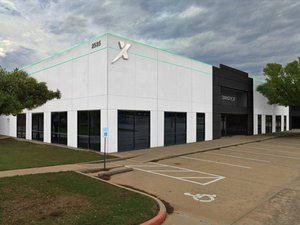
The thing about 2018 tech trends is that many of them were also touted as the things to watch in 2017. Tech moves faster each year, but rarely do game-changing movements confine themselves to calendar years.
That was part of the theme portrayed by Jay Williams, founder of Williams Technology Group and a veteran technologist, who spoke at the Austin Forum on Technology and Society's annual discussion of upcoming trends Wednesday night at the new Austin Central Library.
He offered an anecdote to encapsulate the accelerating progression of tech. Saturn V, the NASA rocket used in the late '60s and early '70s, took a decade and more than a billion in today's dollars to get off the ground. Today, SpaceX is slated to test fire its Falcon Heavy rocket, which can carry 100 times more than the Saturn V at a far lower cost and in less time.
Likewise, he said, accelerating innovations in software and hardware have made it dramatically easier for most people to bring new ideas to fruition.
Here's a look at other 2018 trends he laid out:
1.) Bitcoin: A year ago, Williams told the Forum to keep an eye on cryptocurrencies. Bitcoin was valued around $1,000 then. Now it's around $14,000. He noted that the first thing purchased with bitcoin was a pizza. It cost 11 bitcoins. "So, clearly, we should all be in the pizza business," he joked. "Because that's a lot for a pizza."
Williams said that initial coin offerings, in which companies draw investment from virtually anyone with an internet connection, raised more money for startups than traditional, early-stage venture capitalists did in 2017. He projected that trend to continue.
2.) Artificial intelligence: You'd have to purposely avoid the news these days to be unaware of advances in AI. Williams said AI is playing a bigger role in an ever-expanding variety of businesses -- from movie graphics to gaming. He noted that AI is able to now beat the world's top players in complicated games like Go, the popular Chinese board game, and that OpenAi teams' machine learning systems beat professional Dota 2 players in head-to-head matches. “We now have capabilities to do things that we never have before,” Williams said.
3.) Global Privacy Regulations: The European Union's General Data Protection Regulation may seem like some esoteric policy to ignore. Williams said it is not. If your products are used by EU countries, you'd best learn about the new regulations and how you may need to design products to better protect users' privacy.
4.) Security: Meltdown and Spectre, the vulnerabilities recently discovered in virtually every computer chip in use these days, could cause significant disruptions this year. Patches to fix machines more than a couple years old require software that could slow your machine down by about 20 percent, Williams warned. But, he noted, some may not notice the changes at all. Meanwhile, those chip vulnerabilities remain a major security concern.
Haydn Shaughnessy, author of several business books, including "Shift: A Leader's Guide to the Platform Economy," gave the crowd of 200-300 people a brief history of the growth of platform-based businesses ranging from eBay to Airbnb and beyond.
He said that Chinese e-commerce giant Alibaba is showing how quickly it can innovate by leveraging a huge population of developers and winning over key markets -- largely due to its proximity to such a huge part of the world's population.
Shaughnessy also focused on the power of decentralizing systems using blockchain, which he expects to continue to be used beyond cryptocurrencies to provide transparency in other processes.

Meanwhile, he said workplaces need to move beyond current development strategies, such as Agile, to innovate more quickly. That, in part, was a hint at his new book "Flow," which discusses lighter frameworks to develop new ideas more quickly.
“We know that people are not happy at work and that people are disengaged," he said. "But we don’t trust people to make decisions. We still impose process on people….”
Allowing workers to trade tasks and do what they're best at, in the right constructs, could greatly accelerate development, he said.
Such fast and efficient development cycles won't work, however, without more executive accountability -- allowing everyone in the company to see what its top leaders are truly invested in and how the executives are spending their time and resources.
If you don't hold executives accountable, you probably lose around a third of your resources, he said.
“Many people, maybe a very large minority of people, are doing work that has no bearing on the company’s fortunes," he said.








